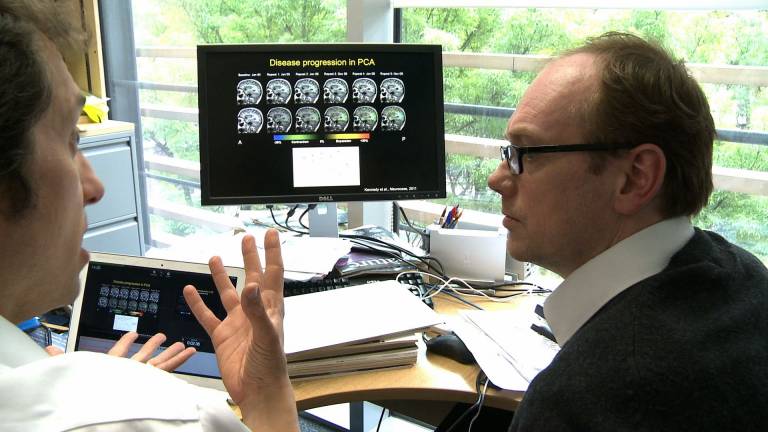Early onset dementia

1 January 1970
Dementia is often seen as a disease of old people - but sadly, that's not the case. Dr Sebastian Crutch specialises in early-onset dementia, which can affect people as young as 40. Having dementia at a younger age, he says, brings its own problems.
"All forms of dementia at all ages are a challenge, but having dementia at 40 is very different from having dementia at 85," says Crutch, professorial research associate at the Institute of Neurology at University College London (UCL).
Dr Sebastian Crutch
"For example, physical aggression can be a symptom, which is very difficult to manage if you live with young children. You will still need to work to pay the mortgage. Your needs will change as your condition changes, and you may live with this condition for a much longer time.
""People are gradually realising that dementia isn't just an inevitable part of ageing - it is in fact a disease. Finding new treatments is a big part of our work, but it's also vital to find ways for people with these conditions and their carers to live well."
The same processes that cause Alzheimer's disease cause early-onset dementia. Not much is known about it, and patients can experience many different symptoms depending on which part of the brain is affected.
For example, people with the form known as posterior cortical atrophy (PCA) may have symptoms which affect their vision, as the back of the brain deals with visual processing. The writer Sir Terry Pratchett, who died in March 2015, was diagnosed with PCA in 2007, when he was 59, and did a great deal to raise awareness of the condition.
Frontotemporal dementia, however, affects the front and sides of the brain which deal with language, planning and behaviour control, so sufferers may experience a change in character.
Listening to patients is a big part of understanding these rare forms of dementia. The institute of Neurology runs regular support groups, allowing clinicians like Crutch to hear first-hand about how the disease is behaving.
"A man once said, at one of our support groups, that he was walking along the pavement and suddenly felt as if he was about to fall off the edge of the world," remembers Crutch. "One lady said she couldn't get her husband to come to the groups any more, as he always felt as if he was leaning over even though he was upright. And one woman asked her daughter: 'Am I the right way up?'
"We thought: what would have to change in your brain for you to need to ask that question? So we have set up a research project investigating how dementia might affect balance. Three years ago, if you'd told me I'd be looking at balance and dementia, I would have said no - why on earth would I do that? But having contact with our patients allows us to investigate new avenues based on their experiences."
Crutch has seen first-hand how valuable it is to have clinicians and researchers working side by side to fight dementia. He's hoping that the new Dementia Research Institute at UCL, partly funded by the money raised by retailers from the carrier bag tax, will attract everyone who can help dementia patients with their expertise.
"It will be critical in driving forward research - and we can only make meaningful progress in many other areas by not just working together but also bringing in people with different backgrounds," he says. "For example, I'd love to see engineers, architects and designers come to the new Institute, using their special knowledge and skills to help people with dementia live well.
"Having somewhere that will bring all these people together, and allow them to work not just next to each other but with each other, will make a huge difference. We can help them understand the problems from the medical professional's point of view, and from the patient's."
 Close
Close


